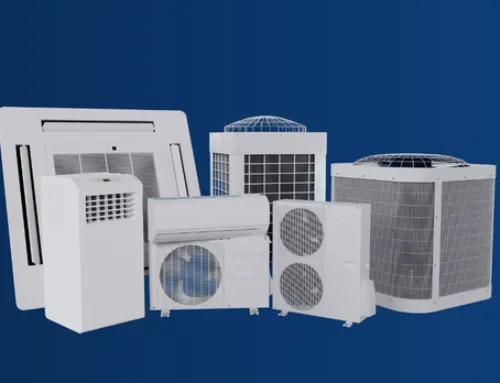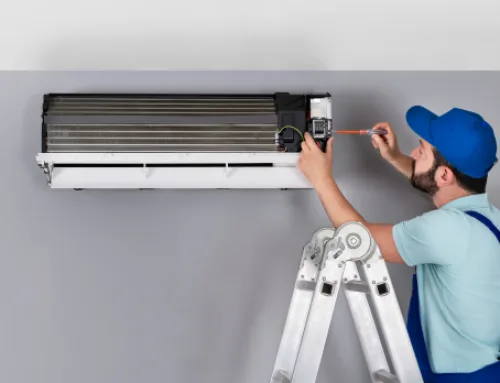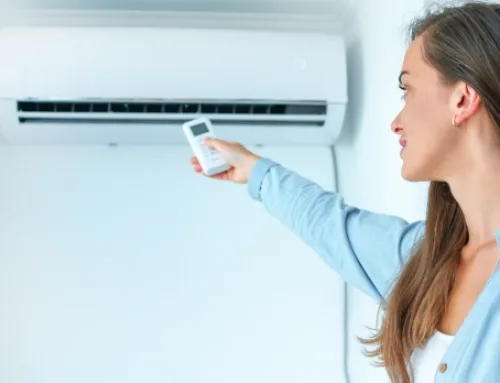It’s very hot this summer, and you want an effective cooling solution, right? You have two different choices in front of you, air conditioner and heat pump. Some homeowners use air-conditioners to cool their homes, but others are switching to heat pumps.
But what’s the difference between a heat pump and an air conditioner? How do they work?
Both these systems have their advantages and disadvantages. In this post, we will look at some basics and key differences between these two effective cooling systems so that you can make an informed decision.
The Basics of Heat Pumps and Air Conditioners
How do the heat pump and air conditioner work? Let’s look at the basics of a heat pump and an air conditioner.
How Does a Heat Pump Work?
Heat pumps use refrigerant to move heat from one place to another. When in cooling mode, the heat pump takes warm air from inside a home and sends it outside.
The refrigerant absorbs the heat as it evaporates and then releases it when it condenses. This process is reversed in heating mode, with the heat pump extracting warmth from outdoor air or ground sources and transferring it indoors.
How Does an Air Conditioner Work?
An air conditioner absorbs heat from indoor air and transfers it outside through refrigeration. A compressor pressurizes the refrigerant, which flows into an evaporator coil inside the home.
As warm air passes over the coil, the refrigerant absorbs its heat and converts it into a gas. The cooled air is circulated back into the living space while the heated gas travels to an outdoor unit to release heat.
Pros and Cons of Heat Pumps
Let’s check out some important pros and cons of heat pumps. It will help you to understand whether it is perfect for your needs.
Pros of a Heat Pump:
- Heat pumps can be more energy efficient than traditional heating and cooling systems because they move heat rather than generate it.
- A heat pump can heat and cool your home, eliminating the need for separate heating and cooling systems.
- Heat pumps produce fewer carbon emissions than other HVAC systems because they transfer existing heat instead of creating it.
Cons of a Heat Pump:
- Due to its complexity, a heat pump’s installation cost may be higher than a traditional HVAC system.
- Heat pumps work best in moderate climates where temperatures do not drop below freezing for long periods.
- Regular maintenance is crucial for the system to work efficiently and last longer, which can become costly if neglected or improperly maintained.
Pros and Cons of Air Conditioners
If you’re considering going with an air conditioner, it’s better to check the advantages and disadvantages of this popular cooling option. So, let’s check them out.
Pros of an Air Conditioner:
- Air Conditioner cools the indoor air quickly and efficiently during hot summer days.
- It helps remove moisture from the air, improving indoor air quality.
- It provides comfort and relief for people with respiratory conditions or allergies.
Cons of an Air Conditioner:
- Air Conditioners use a lot of energy, which can increase your electricity bill significantly.
- Frequent use of AC may require maintenance services that can be costly.
- Some models’ cold temperatures could cause health issues such as headaches or dry skin.
Key Differences Between Heat Pumps and Air Conditioners
If you are confused between choosing the heat pump or the air conditioner, we have put together a few comparative points so you can make an informed choice.
Energy Efficiency
Heat pumps are more efficient in climates with mild weather conditions where the temperature hardly ever drops below freezing. Conversely, air conditioners generally exhibit greater efficiency in areas experiencing hot summer months and mild winters.
They require less energy than a heat pump for cooling your home because, during the summer, their workload is limited by working solely against the outdoor temperature.
Cost
Heat pumps are typically more affordable than air conditioners in general. Heat pumps are designed for dual functionality in both heating and cooling modes, whereas air conditioners solely deliver coolness.
Using electricity to move the air instead of producing it makes the heat pump more efficient.
More components and installation time are needed for a heat pump, making its initial cost higher than that of an air conditioner.
Maintenance
In terms of maintenance, a heat pump typically requires less effort than an air conditioner. Air conditioners are only utilized during warmer months, while heat pumps operate all year round.
Less moving parts in heat pumps compared to air conditioners result in a decreased chance of component breakdowns or malfunctions. Heat pumps nowadays are designed to be low-maintenance and highly efficient machines that can endure for many years with minimal upkeep.
Longevity
Regarding longevity, air conditioners tend to last longer than heat pumps. Because as said earlier, heat pumps are meant for year-round use, while air conditioners are mainly used in warmer months.
However, heat pumps don’t rely on combustion to generate heat. Instead, they use electricity and refrigerant coils to transfer heat from one place to another. It means less wear and tear on the unit over time.
Size
Heat pumps are typically smaller than air conditioners because they don’t need distinct indoor and outdoor units, as air conditioners do. A typical residential heat pump unit and a standard AC unit share similar dimensions.
Yet, it may vary in size slightly based on the maker. A more compact alternative can be found in mini-split heat pumps. They don’t sacrifice performance, but they do take up less space. Conventional central air conditioning systems are typically bigger and heavier than heat pumps, which only need one indoor or outdoor unit.
Heat Pump vs Air Conditioner: Which Is Best for Your Home?
A heat pump could be a budget-friendly option if you live in areas that experience mild winters due to its ability to function as both an AC and a heater.
Combining an air conditioner and furnace could be ideal for homeowners living in excessively high summer temperatures or harsh winter conditions. Still, an individual AC system or furnace can suffice for those not residing in such locations.
An AC unit might be more affordable if you already possess a functioning furnace set up at your house instead of investing in installing an entirely new heat pump mechanism.
Each option—heat pumps or air conditioning units—has its pros and cons. Ultimately, what you specifically need and prefer will dictate the optimal choice for your home. Heat pumps use energy more efficiently. Additionally, they offer heating and cooling options, which could save you money eventually. In contrast, air conditioning units are more robust and can swiftly cool a home.
You can contact us if you still have any doubts about the heat pump or air conditioner. We are happy to help you!
Infiniti Home Comfort is Durham region’s leading Air conditioner and Heat pump service provider. Our team of expert technicians can help you install, repair, or replace your air conditioner or heat pump at your convenience!




